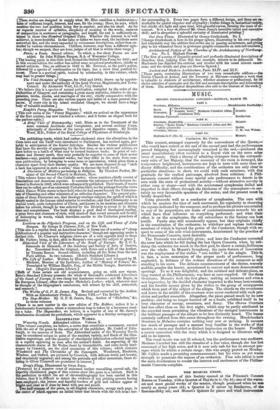MUSIC.
SECOND PHILHARMONIC CONCERT—MONDAY, MARCH 80.
PASS I.
Overture, Melusina Ifendetssohn Bartholdyr
Recit. i" n2 s'eloignent," Romance, " Sombre forit," Madame Caradori Allan,lRossinl.
(Guillaume Tel()
SInfonla Pastorale Beethoven.
PART II.
Overture, Zauberflae Mozart.
Duette, "Bella Rhea," Madame Caradori Allan and Mr
Calkin (Jessonda) Spohr. Overture, Oberon C. M. von weber.
PAST III.
Sinfonta in C (No. 6) Mozart. • Conductor, Mr. COSTA.
This concert, arranged expressly for the convenience of the Queenr=i who would have retired at the end of the second part had the performances proved fatiguing, but encouragingly remained to the end,—produced the usual unsatisfactory effect incident to a Royal visit on the mere sober lover of music. Such a throng of admiring strangers form the extraordi- nary suite of her Majesty, that the economy of the room is deranged, the temperature heightened, instruments are kept in tune with more than or-, dinary difficulty, and the combinations of the orchestra are only clear in particular situations: in short, we could wish such occasions, with due gratitude for the exalted patronage, absolved from criticism. A PhR- harmonic concert without some special solo performance to denote in its own walk the state of professional activity—without attractive novelty in either song or singer—and with the accustomed symphonies dulled and imperfect in their effects through the thickness of the atmosphere—is cer- tainly no very favourable specimen of, the series; and the present must be briefly despatched. Costa proceeds well as a conductor of symphonies. The care with which he masters the time of each movement, his regularity in observing the repeats indicated by the composer, and to produce his picture uncurtailed in any of its proportions, are traits of conscientiousness towards his art which have their influence on everything performed; and what their effect is on the symphonies, the old subscribers to the Society can best testify. Faults may still occasionally appear, but they originate chiefly
in the constitution of the orchestra; to withdraw and replace individual members of which is beyond the power of the Conductor, though with re- spect to some of the solo wind-instruments, deteriorated by the practice of the Promenade Concerts, most desirable.
The Pastorale was admirably given; and here the Conductor corrected the error into which he fell during the last Opera Concerts, when, by sub- duing the orchestra too much in the first part, he threw a certainfeebleness over the whole. In Mozart's Symphony, the main feature of innovation was the employment of the violins " con sordini " in the adagio. This it; in fact, a mere restoration of the proper mode of performance, long neglected, in defiance of the written directions of the composer as still standing in his score. The delicate commencement of the theme, scarcely audible, puzzles the hearer, accustomed to coarser and more demonstrative openings. To us it was delightful; and the subdued and delicate piano, so long wanted at the Philharmonic, was here at once supplied. Of the three Overtures, Mozart's took the first place; making an immense and even a new impression, by the decided character imparted to the brass instruments, and the forcible accent given by the violins to the group of semiquavers which form part of the subject of the allegro. The chords on the trombones and horns in the middle of the overture were never rendered with such pre- cision and perfect ensemble. Altogether, the piece gained much by its new position; and being no longer hurried off as a finale, exhibited itself in its true character of energy, sweetness, and fancy. The Oberon Overture had less effect than on the first night; which may be partly attributed to the crowded room permitting the vibrations of the stringed instruments in the brilliant passages of the allegro to be less distinctly heard. The bassos certainly suffered from this cause throughout the evening. Mendelssohn's Overture to Melusina contains nothing very new or striking. It savours too much of passages and a manner long familiar in the works of that master, to cause any decided or distinct impression on the hearer. Possibly a nearer connexion with the story which it is designed to illustrate might add to its interest.
The vocal music was not ill selected, but the performance was mediocre. Madame Caradori has still the remains of a fine voice, though she has lost command of her high notes, and it is now only safe for her to attempt pas- sages which lie within a certain range: this was amply proved on Monday. Mr. Calkin made a promising commencement; but his voice as yet wants strength to penetrate the masses of an orchestra. Fine solo talent is now the main desideratum to render the interest and excitement of the Philhar- monic Concerts complete.


























 Previous page
Previous page